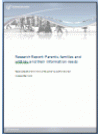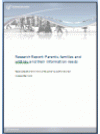This report describes the main findings from research that provides valuable, in-depth insights about the information and communication needs of parents, families and whānau when they are:
- choosing a school for their child
- seeking information about their child’s school so that they can assess and compare their child’s learning progress and achievement with other students at the same level, and know how to ask appropriate questions
- determining their individual child’s learning, progress, achievement, next learning steps and wellbeing.
-
The research involved six focus group discussions targeting particularly Māori and Pasifika parents, families and whānau of Years 1 to 8 and Years 9 to 13 students. Focus groups had 7 to 10 participants each and participants’ children attended low to mid-decile (1-5) schools in either Wellington or Auckland. As well as the focus groups, 64 parent participants from across the country contributed to an online forum.
Key Results
Parents had different expectations about the level and type of information they wanted from schools and teachers. This depended on their views about their role in student learning. Parents’ comments highlighted variations in their perceptions of how well school management, boards of trustees and individual teachers communicate with and inform their parent community.
There were examples of schools and teachers being very proactive, frequent, innovative, welcoming, inclusive and comprehensive in their communication and information approach, while others were less so. Parents, families and whānau circumstances and expectations varied but, for a variety of reasons, they said they had difficulty accessing and assessing information from their child’s school, the Ministry of Education, ERO (Education Review Office), and NZQA (New Zealand Qualifications Authority).
The information from parents, families and whānau in the research shows they are keen to: access independent and comprehensive information that gives them an objective, balanced view of their child’s school, including the quality of teaching, and the school culture, particularly responsiveness to multicultural or bicultural needs and special education needs have regular communication between home and school that provides an assessment of whether their child is progressing and achieving, and alerts both parties (parents and teachers) if there are any well-being issues.
Parents said they needed to access and weigh-up information. They thought that schools and others could help them do this by: anticipating and actively providing information to meet their needs providing information where parents, families and whānau know to find it making information easy to understand, using parent-friendly language not jargon or education language keeping information up-to-date using a range of methods to give information, like texts, email, phone, online, hard copy, face-to-face actively involving and partnering with parents, families, whānau and students in decisions about what information to provide and how.
In terms of content, parents, families and whānau indicated that they want information and communication about their child that is: specific to their child, but allows them to understand how their child is doing compared to what they should be achieving and other students broad and comprehensive, covering strengths as well as areas to develop objective, balanced and fair gives them excellent insight into their child’s learning progress, achievement, next steps and well-being.
While these were the important things parents wanted to know about, they also did not want to compromise teaching and learning by increasing teacher workload.


